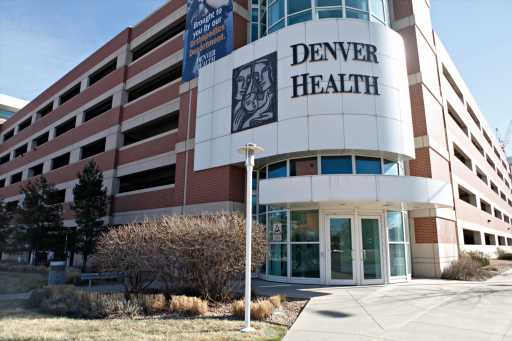Colorado lawmakers fast-track $5 million payment to Denver Health
Citing rising costs and the enduring impacts of the pandemic, a bipartisan group of Colorado legislators is fast-tracking a $5 million payment to Denver Health to help financially stabilize the city’s safety net hospital.
Legislative leaders have had conversations with Denver Health about its financial situation in recent months, and the hospital has become “increasingly concerned about the high level of unreimbursed expenses (and) the high cost of caring for an increasing number of health conditions,” said Sen. Rachel Zenzinger, an Arvada Democrat and chair of the powerful Joint Budget Committee. She said the facility had roughly 80 days’ cash on hand as of early February.
Donna Lynne, CEO of Denver Health, said the amount of uncompensated care the hospital provided had roughly doubled since 2020, to $120 million in 2022. Denver Health has a budget of about $1.3 billion.
About one-third of the hospitals’ patients come from outside Denver, so the hospital needs support from the rest of the state, Lynne said.
“That puts a big strain on us, given that many of them are uninsured,” she said.
In a brief explanation justifying the funding request, legislators wrote that the hospital’s “financial duress” was due to its lower-than-expected share of insured patients and its increasing payroll costs. The state Department of Health Care Policy and Financing had offered an additional $1.4 million for Denver Health. Zenzinger said that money is helpful but that legislators felt that “we need to do more,” given the role Denver Health plays in treating the city and state’s indigent population.
“They probably needed $10 million,” she said. “But we are also aware that (the governor’s office) is working on getting them some other support through some other channels, so we feel pretty confident that, in combination with everybody working on this problem, we’re going to be able to assist during this difficult time.”
Melissa Dworkin, spokeswoman for Gov. Jared Polis, said in a statement that the administration was working with Denver Health and it had allocated $4 million in federal COVID-19 stimulus dollars to the hospital. That money came in November, Zenzinger said, adding that she had also heard that the governor’s office expects “to do another $20 million in February.”
Lynne said the hospital has asked Polis’ office and Denver Mayor Michael Hancock to do more to connect people who are homeless to routine health care and permanent housing. Some patients end up having long hospital stays because they don’t have a safe place to recuperate, and others keep cycling in and out because they aren’t able to manage their health conditions, she said.
“There’s just no place for them to live or to get those services,” she said.
The legislature’s $5 million proposal is being fast-tracked, Zenzinger said, and she called the request “a little extraordinary.” The proposal has the backing of Democratic Rep. Shannon Bird and Republican Sen. Barbara Kirkmeyer, both of whom also sit on the budget committee. The money will be available immediately, Zenzinger said, once it’s passed by the legislature and signed into law.
The $5 million wouldn’t solve all Denver Health’s financial problems, but it would allow the hospital to offer better pay and retain workers, Lynne said. Traveling nurses tend to earn significantly more than permanent ones, and hospitals are competing for workers, she said.
Denver Health reported a $39.9 million operating loss in the first nine months of 2022, meaning it spent more on patient care than it received in payments for that care. That gap narrowed to about $34 million by the end of the year, after the hospital renegotiated its contracts for travel nurses and was able to slow the rate of permanent staff leaving, Lynne said.
In a summary for bond investors in October, the hospital attributed the shortfall to lower-than-expected numbers of patients with commercial insurance, which pays the highest rates; higher-than-expected amounts of charity care; lower patient volumes overall, because some beds were closed; and continued extra expenses to hire travel nurses, who command higher wages than permanent staff.
Those concerns are echoed in a preamble to the $5 million legislative proposal. It’s rare for budget requests to come with an explanation for lawmakers, Zenzinger said, which reflects the seriousness of the situation and the important role Denver Health plays in the city and state.
“We don’t usually do that on the Joint Budget Committee, but we felt that it was important that we justify to our colleagues why we’re taking this extraordinary step because it’s a little extraordinary,” she said. ” … Just learning more about the issue really made it apparent to us that we needed to do what we could.”
Revenues at the hospital were up by about $43 million in the first nine months of 2022 compared to the same period in 2021, but expenses rose by $81 million.
Denver Health reported it also lost about $2 million in the first nine months of 2021. The hospital had a razor-thin profit margin of 0.8% for the entire year of 2021 when other sources of income are included, according to data compiled by the Colorado Department of Health Care Policy and Financing.
Lynne said Denver Health should close its budget gap this year and have healthier margins in 2024, assuming current trends continue.
“We’re working very hard to break even,” she said, “but break(ing) even is not a sustainable strategy.”
Stay up-to-date with Colorado Politics by signing up for our weekly newsletter, The Spot.
Source: Read Full Article

